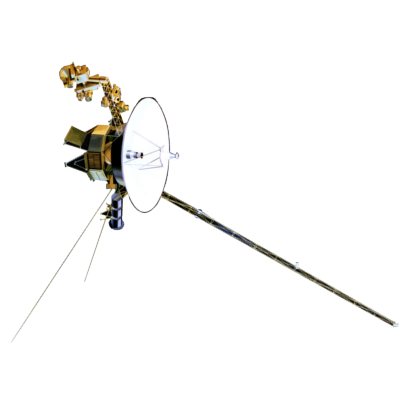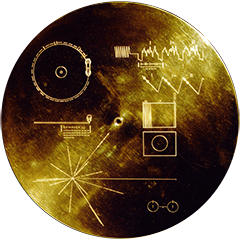VOYAGER
Attachment G
Voyager LECP Data Analysis Handbook
Data File Descriptions
Supplementary EDR
Attachment G
Pointing Vector Data Block Format
| Word | Description | Units | Type |
|---|---|---|---|
| 1 | SCE GMT Year of Pointing Vector Data Block | years, AD | I |
| 2 | SCE GMT Day of Pointing Vector Data Block | day of year | I |
| 3 | SCE GMT Hour of Pointing Vector Data Block | hour of day | I |
| 4 | SCE GMT Minute of Pointing Vector Data Block | minute of hour | I |
| 5 | SCE GMT Second of Pointing Vector Data Block | second of minute |
I |
| 6 | SCE GMT Millisecond (msec) of Pointing Vector Data Block |
msec of second |
I |
| 7 | FDSC MOD16 Count Value of Pointing Vector Data Block | binary counts | I |
| 8 | FDSC MOD60 Count Value of Pointing Vector Data Block | binary counts | I |
| 9 | Pitch Limit Cycle Angle (Rotation about the S/C X-Axis with the positive direction determined by the right hand rule) | deg | E |
| 10 | Yaw Limit Cycle Angle (Rotation about the S/C Y-Axis with the positive direction determined by the right hand rule) | deg | E |
| 11 | Roll Limit Cycle Angle (Rotation about the S/C Z-Axis with the positive direction determined by the right hand rule) | deg | E |
| 12-14 | Cartesian Unit Vector of the S/C X-Axis, S/C Centered, Earth Mean Ecliptic and Equinox of 1950.0 | dim | E |
| 15-17 | Cartesian Unit Vector of the S/C Y-Axis, S/C Centered, Earth Mean Ecliptic and Equinox of 1950.0 | dim | E |
| 18-20 | Cartesian Unit Vector of the S/C Z-Axis, S/C Centered, Earth Mean Ecliptic and Equinox of 1950.0 | dim | E |
| 21-22 | Celestial Clock and Cone Angles of CRS LET C Boresight | deg | E |
| 23-25 | Cartesian Unit Vector of the CRS LET C Boresight, S/C Centered, Earth Mean Ecliptic and Equinox of 1950.0 | dim | E |
| 26-27 | Celestial Clock and Cone Angles of CRS LET A Boresight | deg | E |
| 28-30 | Cartesian Unit Vector of the CRS LET A Boresight, S/C Centered, Earth Mean Ecliptic and Equinox of 1950.0 | dim | E |
| 31-32 | Celestial Clock and Cone Angles of CRS LET D Boresight | deg | E |
| 33-35 | Cartesian Unit Vector of the CRS LET D Boresight, S/C Centered, Earth Mean Ecliptic and Equinox of 1950.0 | dim | E |
| 36-37 | Celestial Clock and Cone Angles of CRS LET B Boresight | deg | E |
| 38-40 | Cartesian Unit Vector of the CRS LET B Boresight, S/C Centered, Earth Mean Ecliptic and Equinox of 1950.0 | dim | E |
| 41-42 | Celestial Clock and Cone Angles of CRS TET Boresight | deg | E |
| 43-45 | Cartesian Unit Vector of the CRS TET Boresight, S/C Centered, Earth Mean Ecliptic and Equinox of 1950.0 | dim | E |
| 46-47 | Celestial Clock and Cone Angles of CRS HET 1 Boresight | deg | E |
| 48-50 | Cartesian Unit Vector of the CRS HET 1 Boresight, S/C Centered, Earth Mean Ecliptic and Equinox of 1950.0 | dim | E |
| 51-52 | Celestial Clock and Cone Angles of CRS HET 21* Boresight | deg | E |
| 53-55 | Cartesian Unit Vector of the CRS HET 21 Boresight, S/C Centered, Earth Mean Ecliptic and Equinox of 1950.0 | dim | E |
| 56-57 | Celestial Clock and Cone Angles of CRS HET 22* Boresight | deg | E |
| 58-60 | Cartesian Unit Vector of the CRS HET 22 Boresight, S/C Centered, Earth Mean Ecliptic and Equinox of 1950.0 | dim | E |
| 61-62 | Celestial Clock and Cone Angles of the LECP Axis of Rotation | deg | E |
| 63-65 | Cartesian Unit Vector of the LECP Axis of Rotation, S/C Centered, Earth Mean Ecliptic and Equinox of 1950.0 | dim | E |
| 66-67 | Celestial Clock and Cone Angles of the PLS Axis of Symmetry | deg | E |
| 68-70 | Cartesian Unit Vector of the PLS Axis of Symmetry, S/C Centered, Earth Mean Ecliptic and Equinox of 1950.0 | dim | E |
| 71-72 | Celestial Clock and Cone Angles of the PLS Lateral Detector Boresight | deg | E |
| 73-75 | Cartesian Unit Vector of the PLS Lateral Detector Boresight, S/C Centered, Earth Mean Ecliptic and Equinox of 1950.0 | dim | E |
| 76-77 | Celestial Clock and Cone Angles of the HGA Boresight | deg | E |
| 78-80 | Cartesian Unit Vector of the HGA Boresight, S/C Centered, Earth Mean Ecliptic and Equinox of 1950.0 | dim | E |
| 81-82 | Celestial Clock and Cone Angles of the PPS Optic Axis | deg | E |
| 83-85 | Cartesian Unit Vector of the PPS Optic Axis, S/C Centered, Earth Mean Ecliptic and Equinox of 1950.0 | dim | E |
| 86-87 | Celestial Clock and Cone Angles of the UVS Airglow Optic Axis | deg | E |
| 88-90 | Cartesian Unit Vector of the UVS Airglow Optic Axis, S/C Centered, Earth Mean Ecliptic and Equinox of 1950.0 | dim | E |
| 91-92 | Celestial Clock and Cone Angles of the UVS Occultation Optic Axis | deg | E |
| 93-95 | Cartesian Unit Vector of the UVS Occultation Optic Axis, S/C Centered, Earth Mean Ecliptic and Equinox of 1950.0 | dim | E |
| 96-97 | Celestial Clock and Cone Angles of the IRIS Optic Axis | deg | E |
| 98-100 | Cartesian Unit Vector of the IRIS Optic Axis, S/C Centered, Earth Mean Ecliptic and Equinox of 1950.0 | dim | E |
| 101 | Continuation Bit: =1, another pointing vector block follows; =0, last pointing vector block in this logical record | dim | I |
| 102 | Azimuth | deg | E |
| 103 | Elevation | deg | E |
| 104 | Twist | deg | E |
| 105-126 | Spares |
* HET 2, Positions 1 and 2, i.e., HET 21 and HET 22
- Table G-1. Nominal S/C Clock and Cone Angles of the Fixed Instrument Boresights
- Right Ascension and Declination Algorithm
Return to SEDR Table of Contents
Return to Data File Descriptions main page.
Return to Voyager
LECP Data Analysis Handbook Table of Contents.
Return to Fundamental
Technologies Home Page.
Updated 8/9/19, Cameron Crane
VOYAGER 1 ELAPSED TIME
--:--:--:--
Days: Hours:
Minutes: Seconds
*Since official launch
September 5, 1977, 12:56:00:00 UTC
*Since official launch
September 5, 1977, 12:56:00:00 UTC
VOYAGER 2 ELAPSED TIME
--:--:--:--
Days: Hours:
Minutes: Seconds
*Since official launch
August 20, 1977, 14:29:00:00 UTC
*Since official launch
August 20, 1977, 14:29:00:00 UTC
QUICK FACTS
Manufacturer:
Voyagers 1 and 2 were built in the Jet Propulsion
Laboratory in Southern California.
Mission Duration: 40+ years have elapsed for both Voyager 1 and Voyager 2 (both are ongoing).
Destination: Their original destinations were Saturn and Jupiter. Their current destination is interstellar space.
Mission Duration: 40+ years have elapsed for both Voyager 1 and Voyager 2 (both are ongoing).
Destination: Their original destinations were Saturn and Jupiter. Their current destination is interstellar space.



